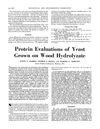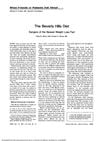 17 citations,
May 2012 in “Clinical Endocrinology”
17 citations,
May 2012 in “Clinical Endocrinology” Surgery to lower high testosterone in postmenopausal women with certain ovarian tumors doesn't significantly affect their metabolism.
 1 citations,
January 1996 in “Springer eBooks”
1 citations,
January 1996 in “Springer eBooks” Diet affects baldness; eat balanced, less animal fat, more fruits, vegetables, and cereals.
 March 2024 in “Animal nutrition”
March 2024 in “Animal nutrition” Adding both soluble and insoluble fibers, especially beet pulp, to the diet of pregnant sows helps improve their health and the growth of their piglets in hot weather.
 2 citations,
February 2023 in “BMC endocrine disorders”
2 citations,
February 2023 in “BMC endocrine disorders” Curcumin improved some metabolic factors in women with PCOS but did not affect cholesterol, insulin, or testosterone levels.
 5 citations,
May 2023 in “Frontiers in immunology”
5 citations,
May 2023 in “Frontiers in immunology” Environmental factors like diet and vitamin levels, especially Vitamin D, can affect autoimmune diseases differently, with lifestyle changes potentially improving outcomes.
 2 citations,
May 2023 in “Current Nutrition Reports”
2 citations,
May 2023 in “Current Nutrition Reports” Eating a Mediterranean diet and taking certain supplements may improve symptoms of PCOS.
4 citations,
December 2021 in “Pharmacological Reports” Metformin is less effective in men with early-onset hair loss.
 41 citations,
September 2014 in “Journal of Pharmacy and Pharmacology”
41 citations,
September 2014 in “Journal of Pharmacy and Pharmacology” Melatonin may help treat PCOS symptoms in rats.
 20 citations,
June 2017 in “Hormone Molecular Biology and Clinical Investigation”
20 citations,
June 2017 in “Hormone Molecular Biology and Clinical Investigation” Long-term use of dutasteride for enlarged prostate may worsen blood sugar, cholesterol, and erectile dysfunction.
 January 2018 in “Journal of general practice”
January 2018 in “Journal of general practice” Young people are losing hair due to stress, poor diet, pollution, and lack of sleep, but it can be treated with supplements and scalp treatments.
 13 citations,
July 1951 in “Industrial & Engineering Chemistry”
13 citations,
July 1951 in “Industrial & Engineering Chemistry” Yeast grown on wood sugar with added methionine could be a cheap alternative to animal protein for feed.
 July 2018 in “International journal of clinical & experimental dermatology”
July 2018 in “International journal of clinical & experimental dermatology” Eat a balanced diet for healthy hair; only use supplements if you have a proven nutrient deficiency.
 815 citations,
April 2010 in “The Journal of Clinical Endocrinology & Metabolism”
815 citations,
April 2010 in “The Journal of Clinical Endocrinology & Metabolism” Women with PCOS should be screened for heart disease risk and manage their health to prevent it.
 18 citations,
August 2019 in “Nutrients”
18 citations,
August 2019 in “Nutrients” Eating barley for life may lead to healthier aging in mice.
 December 2011 in “The Egyptian Journal of Histology”
December 2011 in “The Egyptian Journal of Histology” High-fructose diets can cause irreversible kidney damage.
 10 citations,
February 2017 in “Hormone Molecular Biology and Clinical Investigation”
10 citations,
February 2017 in “Hormone Molecular Biology and Clinical Investigation” Metformin effectively improves metabolic symptoms in women with PCOS, while alfacalcidiol does not have a significant impact.
 54 citations,
August 2017 in “Gynecological Endocrinology”
54 citations,
August 2017 in “Gynecological Endocrinology” Lifestyle changes and weight loss are key for treating PCOS-related metabolic issues and infertility, with various medications available for specific symptoms.
 1 citations,
February 2021 in “Animal feed science and technology”
1 citations,
February 2021 in “Animal feed science and technology” Organic selenium may offer better retention and less waste in puppies.
 18 citations,
November 1981 in “JAMA”
18 citations,
November 1981 in “JAMA” The Beverly Hills Diet is unscientific, potentially harmful, and could cause serious health issues.
 2 citations,
July 2011 in “Journal of the Egyptian Women's Dermatologic Society (Print)”
2 citations,
July 2011 in “Journal of the Egyptian Women's Dermatologic Society (Print)” Eating nuts, chocolate candy, and red tea might worsen acne, while eating more fresh vegetables could reduce it.
 February 2024 in “Curēus”
February 2024 in “Curēus” A balanced diet with proteins, vitamins, and minerals is crucial for managing skin disorders.
 January 2024 in “Journal of Ayurveda and integrative medicine”
January 2024 in “Journal of Ayurveda and integrative medicine” Millets may help reduce chemotherapy side effects like nausea, fatigue, and hair loss.
 7 citations,
September 2020 in “Journal of Cosmetic Dermatology”
7 citations,
September 2020 in “Journal of Cosmetic Dermatology” Minoxidil and Finasteride are the most popular hair loss treatments, with rising interest in other options, and economic or health crises can change what treatments people prefer.
 26 citations,
January 2000 in “Hormone research in paediatrics”
26 citations,
January 2000 in “Hormone research in paediatrics” Insulin resistance is linked to high male hormone levels in women, often seen in those with PCOS.
 November 2023 in “Curēus”
November 2023 in “Curēus” Eating junk food is linked to higher rates of PCOS and related symptoms in women.
 7 citations,
January 2022 in “Evidence-based complementary and alternative medicine”
7 citations,
January 2022 in “Evidence-based complementary and alternative medicine” Ginger supplements helped reduce symptoms and improve metabolic health in hypothyroid patients.
 1 citations,
January 2023 in “Nutrients”
1 citations,
January 2023 in “Nutrients” Drinking lots of sugary drinks may increase the risk of hair loss in young men.
 August 2024 in “Frontiers in Nutrition”
August 2024 in “Frontiers in Nutrition” Antioxidant-rich diets may reduce hair loss risk, while pro-inflammatory diets may increase it, especially in women.
 3 citations,
May 2021 in “Molecules”
3 citations,
May 2021 in “Molecules” Rosuvastatin improves lipid levels, reduces inflammation, but worsens insulin sensitivity in men with early-onset hair loss.
2 citations,
August 2022 in “Middle East Fertility Society Journal” The new rodent model successfully mimics non-lean human PCOS symptoms.



























